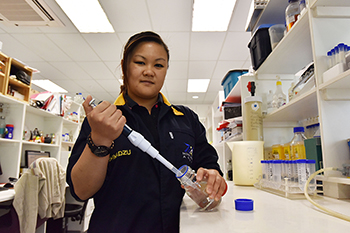Latest News Archive
Please select Category, Year, and then Month to display items
16 April 2024
|
Story Anthony Mthembu
|
Photo Supplied
 Melanie Ridgard celebrates receiving a Master of Business Administration (MBA) at the graduation ceremony held at the UFS Bloemfontein campus on 19 April 2024.
Melanie Ridgard celebrates receiving a Master of Business Administration (MBA) at the graduation ceremony held at the UFS Bloemfontein campus on 19 April 2024.
In the realm of self-development, few stories are as inspiring as that of Melanie Ridgard, the Interim Administration and Events Coordinator at the South African Research Chair in Industrial Development (SARChI-ID) at the University of Johannesburg (UJ). Ridgard’s forthcoming graduation with a Master in Business Administration (MBA) on 19 April 2024 from the University of the Free State (UFS) marks not only a personal triumph but also a testament to the transformative power of higher education.
Reflecting on her journey, Ridgard shares, “This moment signifies a culmination of rigorous studying, dedication and perseverance in mastering business fundamentals, leadership skills and strategic thinking.” Her pursuit of an MBA stemmed from a pivotal moment in her career when she was promoted at the Centre for Teaching and Learning (CTL) at UFS. Tasked with leading a group of young people Ridgard recognised the need to augment her knowledge to effectively guide her colleagues. The MBA became her vehicle for professional growth, extending beyond a mere qualification to a profound transformation of her leadership capabilities.
“Attaining an MBA milestone represents a transformative experience that has shaped my thinking to make impactful contributions in any future landscape,” Ridgard explains. Her experience not only enhanced her strategic acumen but also deepened her understanding of organisational dynamics. She acknowledges the pivotal role played by the UFS Business School in nurturing her journey towards academic and personal success.
What to expect from Ridgard
Looking ahead, Ridgard’s commitment to continuous learning remains unwavering. Selected as one of five MBA students to address the 17th International Business Conference (IBC) in September 2024, she eagerly anticipates the opportunity to share insights on her work titled, “Next-Gen Integration: Navigating the Onboarding Maze for Gen Z in Today's Workplace.” Despite her current responsibilities at UJ, she harbors plans to pursue a PhD in the near future.
Amidst her ambitious pursuits, Ridgard remains grounded, prioritising the celebration of her MBA achievement. ‘’As everyone dreams about it, I just want to walk over that stage in a black gown and a hood on my head with my loved ones cheering me on,’’ she shared.
Ridgard’s journey serves as a beacon of inspiration, exemplifying the transformative potential of education and the enduring impact of determined leadership. Her story reminds us that true leadership is not merely about reaching milestones but also about empowering others and embracing continuous growth.
The impact of personal care products on water resources in the Free State
2015-12-14

Jou-an Chen
Photo: Charl Devenish
|
Water is of the utmost importance in personal hygiene. Most people can hardly have a day go by without taking a shower in the morning and at night. However, it is this very habit that is increasingly polluting the water resources in South Africa.
Contaminants found in pharmaceutical and personal care products have been accumulating in water masses in recent years. These contaminants especially refer to hormones in medication, as well as colouring agents and fragrances used in soap, shampoo and body lotions.
“Little information and data are available on the prevalence of these contaminants, and on how high the level of pollution really is,” says Jou-an Chen, researcher in the Department of Microbial, Biochemical and Food Biotechnology at the UFS.
Her research particularly focuses on the prevalence and impact of those contaminants.
“Because these substances have not been properly investigated, we are not sure how widely it occurs and whether it is harmful to the environment. It was precisely the lack of information that has inspired me to investigate further.”
“If we could identify the contaminants and what it is doing to the environment, it could make a valuable contribution to directives on water quality standards.”